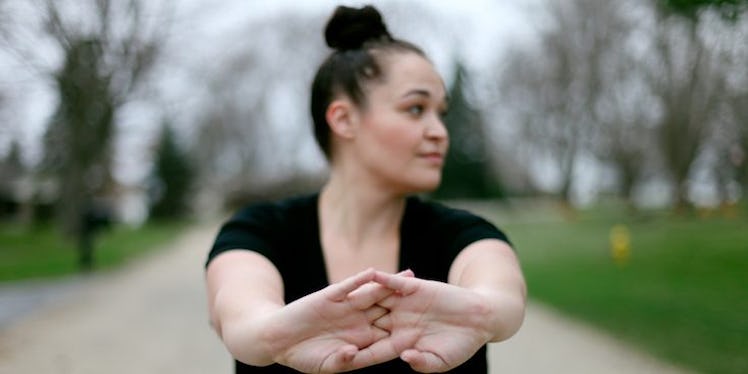
6 Foolproof Ways To Stop Comparing Yourself To Others When You're At The Gym
Exercise is usually thought of as a physical activity, but it can be just as much an emotional and mental journey -- one that should positive nurture and support your overall well-being. While society often portrays fitness as a means to change the way you look by reducing your size or actually changing the shape of your body, for me, those ideas aren't fuel for self-acceptance and positive self-image. This is why, in your journey to better both your physical and mental well-being, it's so important to learn how to stop comparing yourself to others at the gym.
Because, in the end, comparing your fitness journey to another person's doesn't accomplish anything for yourself, for the other person, or for anyone, really. And, personally, the more I work toward practicing positive thinking and self-acceptance in my own exercise practice, the more fun, free, and balanced the experience feels overall. Besides isn't that the point of working out anyway, to feel good about the whole thing?
Elite Daily had a chance to speak with sport psychologist and business mentor Dr. Ariane L. Machin about some healthy ways to help you focus on feeling good for you when you exercise, rather than comparing your progress to someone else's.
1. Get Off The 'Gram
Dr. Machin recognizes that, while not engaging in comparison is no easy feat, it's still really important to at least try to combat that negative mindset. That might mean logging off of Facebook and Instagram if you can't help but scroll and despair.
She tells Elite Daily,
When we start to compare our bodies or fitness 'progress' to others, we sometimes feel discouraged and disheartened.
Dr. Machin explains that these fixations with the "perfection" we often see on social media can often result in a choice to not exercise. Or, if you can muster the energy to go to the gym, you often end up just being really hard on yourself.
2. Do What's Fun For You, And Only You
Do you like dancing? Sprinting? Tai chi? Recreational sports? Think about what your favorite parts of the actual movement experience are, and focus on those. If it's a habit you actually enjoy, you're much more likely to make the time to do it.
And if you haven't found something you like yet, try new things, and then try new things again! There are literally countless different ways to move your body, so if you keep looking, you'll find one that feels like an actual good time. I promise.
3. Personalize Your Routine
That means how you move, the time you work out, the frequency, what you like to eat to support your practice, and the music you listen to, among a whole host of other things.
Dr. Machin shares with Elite Daily,
Just because other people think you should work out first thing in the morning, for example, or that some work out on empty stomach, should not mean that is your chosen behavior. You do what works for you.
Amen, Dr. Machin.
4. Remember That Exercise Simply Equals Movement
Dr. Machin encourages people to redefine what exercise and movement mean to them. Plus, remember that exercise is movement, and vice versa. It's an infinite spectrum -- not just cardio blasting and push-ups.
She explains,
There is not a 'right' or 'wrong' way to do movement, and when we think of how and what we can do to move each day, it can feel a lot easier than 'running three miles on the treadmill for exercise.'
Consider your own body, your own abilities, and your own speed when you think about how to guide your movement.
5. Use Encouraging Words That Speak Uniquely To You
Dr. Machin recommends developing a cue word that helps you get motivated:
'Strong' and 'push' can be words that we can associate with working hard. Say these cue words to yourself to help you get motivated in the moment.
Again, there's no right or wrong way to go about this one either. It's all about whatever makes you feel best about continuing your exercise practice.
6. Focus On Personal Strength
And that applies not just to your body, but your whole self. You're doing this to support your well-being so you can be the best version of yourself and live your absolute best life. That's real strength.